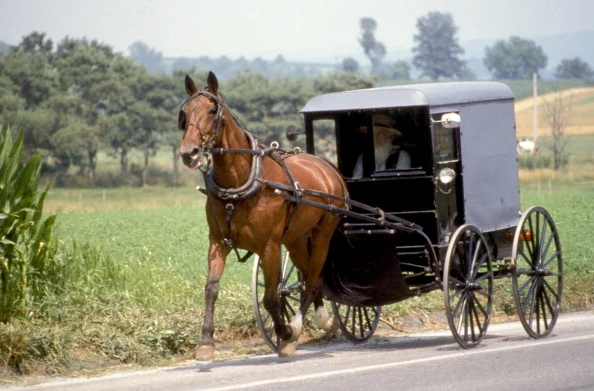By Tatum Isaacs
Recently, Amish residents in Auburn, Kentucky received attention for fighting back against an ordinance requiring large animals to wear collection bags to catch their droppings. [i] The language of the ordinance requires that “a properly fitted collection device shall be securely in place on all horses or other large animals while such animals are on the street within the city limits.” [ii] Anyone found guilty of violating the ordinance is only guilty of a violation (rather than a misdemeanor or a felony) and is subject to a $50 fine for each offense. [iii] Many have refused to comply based on concerns that the bags may frighten their horses, which has led to an accumulation of cases being brought on the issue. [iv]
On October 26 alone, the Logan District Court heard thirty cases involving eleven defendants who had violated the ordinance. [v] A number of these cases have also been brought to trial, only one of which resulted in an acquittal. [vi] The rest of the defendants were found guilty, leading some defendants to be held in contempt for still refusing to pay the fine. [vii]
Attorney Travis Lock filed a notice on behalf of the Amish defendants, arguing that the ordinance is unconstitutional as applied.[viii] “It’s been clearly designed to single out the Amish and frankly, to discriminate against the Amish. This ordinance was passed to target this particular group of Amish in the Auburn community and that in and of itself is unconstitutional and discriminatory,” Locke said.[ix] City officials in Auburn have defended the ordinance as necessary to ensure that city streets remain clean and to reduce the spreading of disease.[x] Judge Kenneth Williams of the Logan District Court set a hearing for April 26 to hear oral arguments.[xi]
In terms of precedent, there appears to be little case law that applies to the issues at stake in Auburn. The Amish defendants in this case are not seeking Constitutional protection based on religion, as in Wisconsin v. Yoder. [xii] Thus, if they intend to prevail under an equal protection argument, the defendants will likely have to argue that the ordinance does not satisfy the minimum rationality standard of review, which is a particularly high burden to overcome.[xiii] If the defendants do not win after oral argument in April, the case can be appealed or re-filed in federal court in Bowling Green as a federal civil rights case.
[i] Justin Story, Auburn Amish continue to fight ordinance, Bowling Green Daily News (Oct. 29, 2016), http://www.bgdailynews.com/news/state/no-dropping-law-mandating-horse-poop-bags-rankles-amish/article_10eb8fb5-f73d-51a7-8dbe-535417264990.html.
[ii] AUBURN, KY. CODE OF ORDINANCES §90.088 (2015), available at http://library.amlegal.com/nxt/gateway.dll/Kentucky/auburn_ky/auburnkentuckycodeofordinances?f=templates$fn=default.htm$3.0$vid=amlegal:auburn_ky.
[iii] AUBURN, KY. CODE OF ORDINANCES §90.999(E)(4) (2015), available at http://library.amlegal.com/nxt/gateway.dll/Kentucky/auburn_ky/auburnkentuckycodeofordinances?f=templates$fn=default.htm$3.0$vid=amlegal:auburn_ky.
[iv] Story, supra note i.
[v] Id.
[vi] Id.
[vii] Id.
[viii] Id.
[ix] Id.
[x] Id.
[xi] Id.
[xii] Wisconsin v. Yoder, 406 U.S. 205 (1972).
[xiii] See Railway Express Agency, Inc. v. New York, 336 U.S. 106 (1949).


